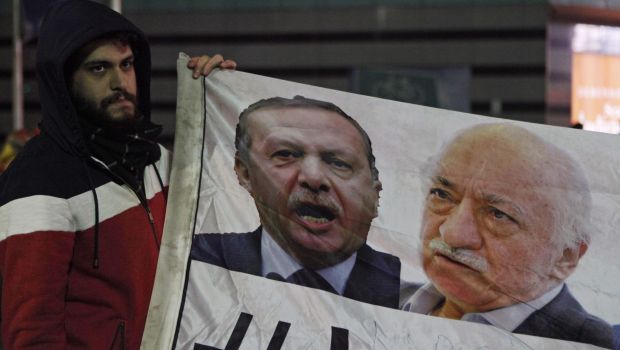
A demonstrator hold pictures of Turkey’s Prime Minister Tayyip Erdoğan and Turkish cleric Fethullah Gülen (R), during a protest against Turkey’s ruling AK Party, in Istanbul December 30, 2013 (REUTERS/Osman Orsal).
Speaking to Asharq Al-Awsat by telephone, Hiwa said: “Erdoğan has lost many of his allies due to the current conflict, and I think his position will be weak in the next elections. And even if he tried, through his visit to Diyarbakir with [Iraqi Kurdistan President] Massoud Barzani, to court the Kurds for his own benefit, the Kurdish people must not interfere in the ongoing conflict and must rely on themselves and support their own real representatives who can represent them at the next parliament.”
Turkish politics have recently been rocked by a falling out between Erdoğan and Gülen, whose influential social and cultural network counts a number of senior state officials among its members. It also includes some figures within Erdoğan’s own Justice and Development Party (AKP).
Earlier this month, a number of allies of the prime minister in the political and business arena were arrested as part of a corruption investigation. Erdoğan denounced the arrests as a plot against his government, and responded by firing a number of senior police officials.
The arrests followed attempts in November to close down a number of private schools operated by Gülen’s movement, which are reportedly a key source of finance for the organization.
Hiwa told Asharq Al-Awsat that Erdoğan had given police and judicial powers to Gülen’s group, which had led the group to act as if it were “a state within a state.”
He said the Turkish prime minister was the victim of his own political strategy, adding: “In the interest of his party, [Erdoğan] made alliances with political and Islamist forces who were planning to attack him, and thus he failed to gain credible political allies, and failed in his promises to end Turkey’s problems with neighboring countries, evidenced by becoming embroiled in the Syrian quagmire and interference in Egyptian affairs, as well as his problems with Iraq.”
Hiwa said the Gülen Group turned against Erdoğan because of “the issue of quotas, where the Gülen Group wanted a bigger share of the gains made by Erdoğan’s party, including the oil agreement between Erdoğan and the Kurdistan Region of Iraq, because this Group controlled important power centers in government that did not want Erdoğan and his party to monopolize the larger share of the gains, and as I said earlier, they see themselves as a state within a state.”
Regarding the effects of the current conflict on the Kurdish issue and the peace initiative launched by detained PKK leader, Abdullah Öcalan, Hiwa said: “There was a strong alliance between Erdoğan and the Fethullah Gülen Group, and the only objective that they shared was the destruction of Kurdish people and their cause, where the Gülen Group resorted to military solutions to eliminate the Kurdish issue, while Erdoğan conducted a policy of containment through psychological warfare and making unenforceable empty promises, and following policies of procrastination”.
He added: “Accordingly, Erdoğan needs the support of the Kurdish people in this current conflict, and this will not happen without resolving the [Kurdish] issue and spreading real democracy in the country. The peace process is still faltering because of Erdoğan’s promises, and peace will not be achieved by one side. There must be a real will to make peace and end the bloody conflict between the Kurds and the Turkish state in order to enable Erdoğan to defeat [rival] internal power centers.”
